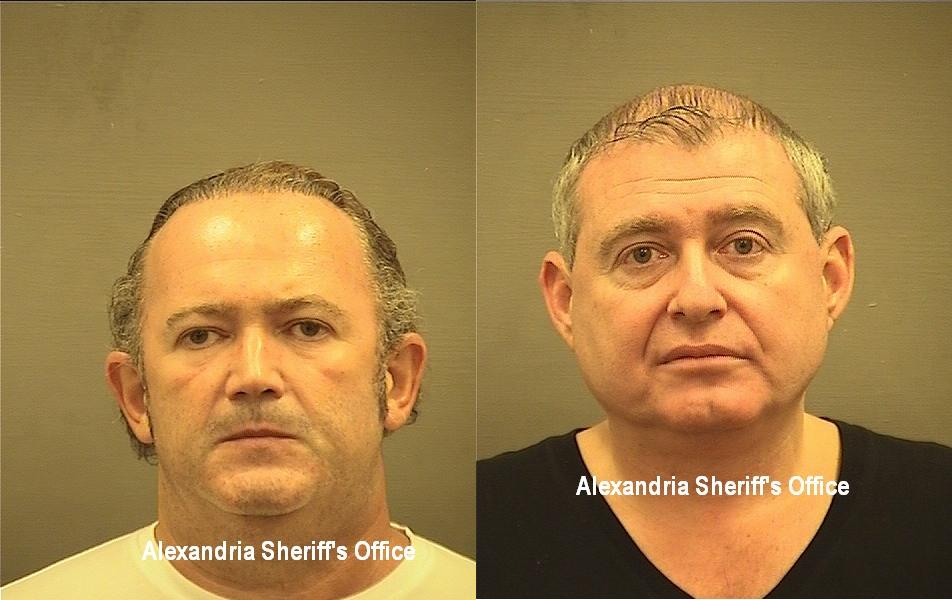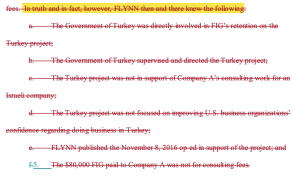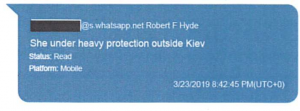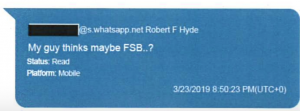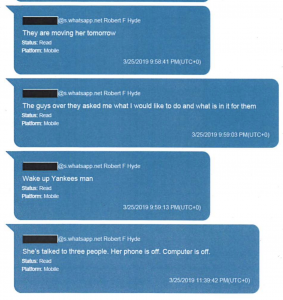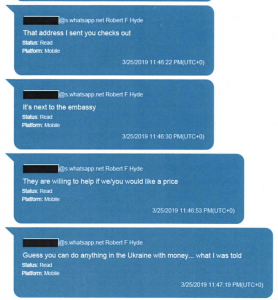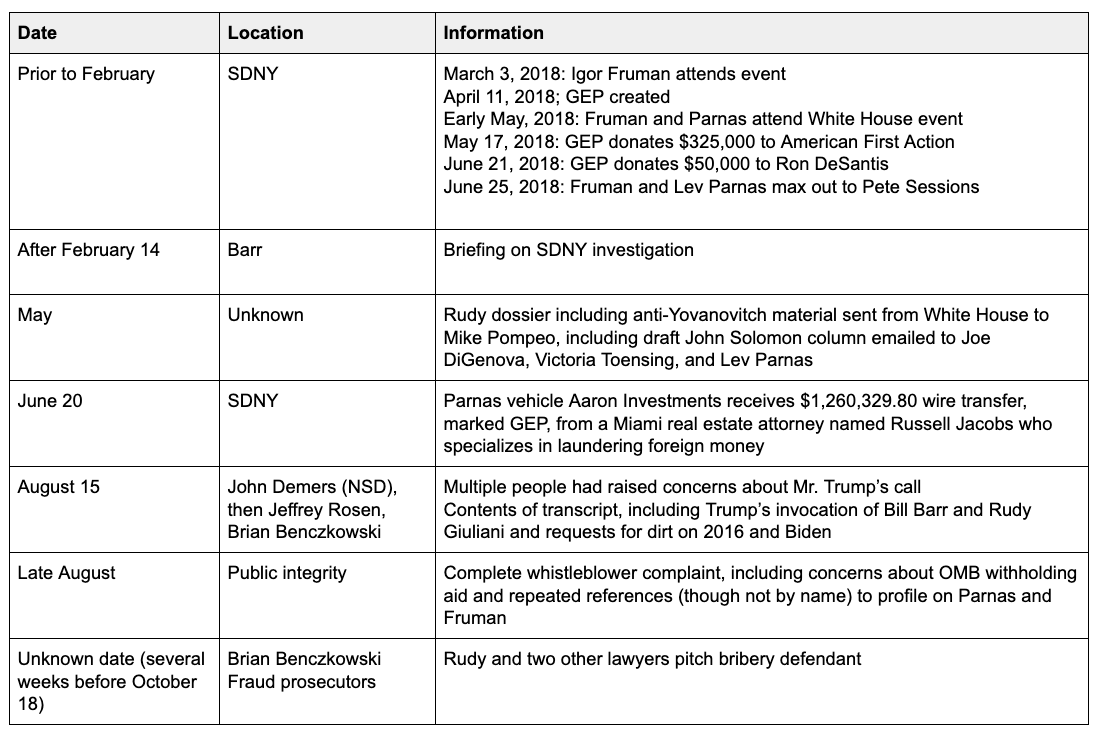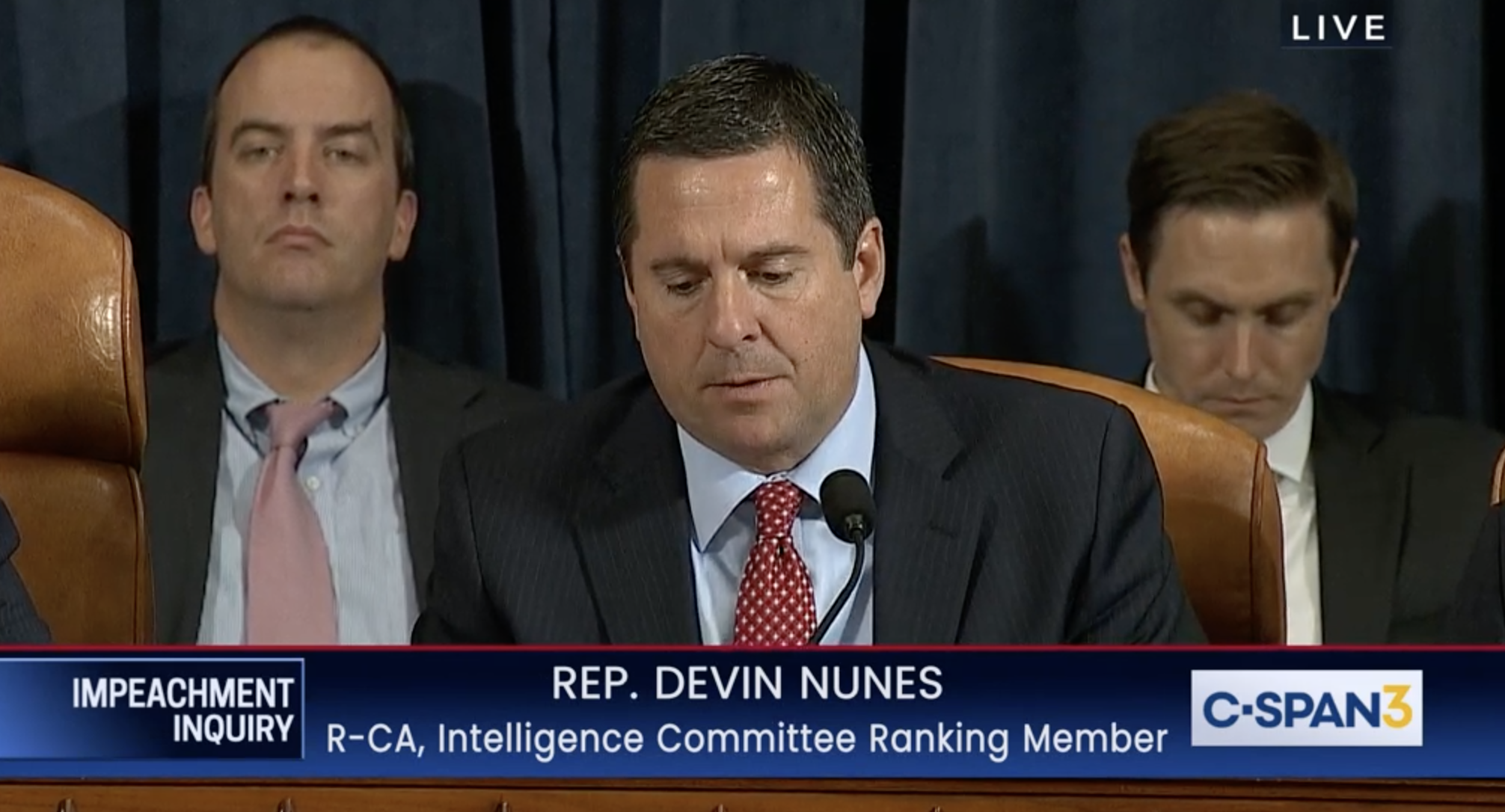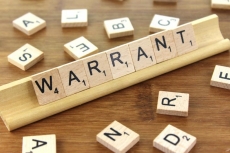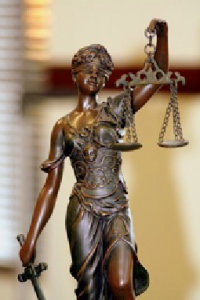I want to wade through some half truths Steve Bannon told in his second Mueller interview, because it serves as a useful baseline to understand what has happened since, including Bannon’s testimony in Roger Stone’s trial.
Bannon had, according to the unredacted entries on a list of all Mueller FBI 302s, interviews with Mueller’s team on four days:
- February 12, 2018 (26 pages)
- February 14, 2018 (37 pages)
- October 26, 2018 (16 pages; the interview list lists three different interviews, but they are likely just copies of the same one)
- January 18, 2019 (4 pages)
The report (called a 302), notes, and backup for the February 14, 2018 interview were released via FOIA just before the Stone trial.
I knew — when this interview was first released — that he was shading the truth, because there was already public evidence that contradicted the story he told back in it and prosecutors caught him in a number of forgetfulness and omissions even within the interview. His Stone testimony and some other 302s released since that time make that even more clear. Which makes how he told the original half truths particularly interesting, as it points to several topics, at least some of which remain under investigation, where Bannon tried to obscure the truth.
Finding the line between false statements and being ousted from the right wing
Consider the background to the interview. Through the entire time he worked on the campaign and in the White House, Bannon was at odds with Jared Kushner, which ultimately led to his ouster from the White House in August 2017. In early January 2018, Michael Wolff’s Fire and Fury, which rather obviously relied heavily on Bannon as a source, came out. Among the incendiary claims Bannon was described as making in the book was that Don Jr’s acceptance of the June 9 meeting was “treasonous.” Even though he issued a sort of apology, Bannon was still ousted from Breitbart, cut off from the wingnut gravy train that is key to his power. Days later, Mueller used Bannon’s comments as an opportunity to subpoena him, long after obtaining testimony from similarly situated people in the investigation (Mueller may have waited because of the evidence Bannon had been part of some back channels during the transition). Between the time Mueller subpoenaed Bannon and he testified with Mueller, he testified to HPSCI, effectively previewing a story he knew would be shared with the White House. All those events likely made Bannon want to tell a story that backed off the inflammatory claims he shared with Wolff, while still hewing closely enough to the truth to avoid prison.
This was a long interview. The report extends 37 pages, the longest of any Mueller interview report noted.
The beginning focuses on obstruction. After five redacted pages, the interview discusses Trump’s disdain for Jeff Sessions. Five pages later, the interview remained focused on Trump’s obstruction, having moved onto his efforts to fire Mueller.
Several pages later, it moved to the June 9 meeting. Bannon said he had no knowledge of the meeting at the time it happened (remember, he joined the campaign in August 2016), which made it easy for him to accuse Jared of treason, since he was uninvolved.
Bannon can’t decide whether he got Manafort fired or tried to protect him
But Bannon’s response to and insulation from the June 9 meeting is important background to where things start to get interesting, an apparent attempt to get Kushner fired in the wake of the June 9 meeting revelations.
On page 14 of the interview, Bannon got shown a July 24 email (PDF 174), which shows him forwarding a July 24, 2017 story implicating Jared in Russian money laundering to someone at Breitbart, telling them not to touch it yet. But the subsequent conversation makes it clear that Bannon was preparing to try to get Jared fired in the wake of the June 9 meeting revelation.
Bannon’s explanation to Mueller’s team was totally nonsensical, not least because he doesn’t appear to address the article at all, but important for everything that came after. He talks about what happened when he joined the campaign.
Bannon knew Kushner was on vacation off the coast of Croatia with a Russian billionaire when Bannon took over the campaign. Kushner was with Wendy Deng, the Russian billionaire, and the Russian’s girlfriend. Bannon said his friends in the intelligence community said the girlfriend was “questionable.” Bannon called Kushner and told him to come back from vacation. They had 85 days to go, no money and they needed Kushner to come back and fire Paul Manafort.
Both by date — 85 days before the election would be — and by public reporting, Bannon is referring to something that happened in mid-August 2016, when Ivanka and Jared were pictured on David Geffen’s boat off of Dubrovnik, probably a hit piece meant to suggest that Kushner was really a Democrat. Later, the frothy left had, in 2017, made much of the fact that Dmitry Rybolovlev was in Dubrovnik at the same time Kushner was. But in his interview, Bannon was basically answering a question about a hit piece from the weeks before he was ousted by making a claim that he had had to recall Kushner from that vacation in Dubrovnik at a time the campaign was failing to fire Paul Manafort.
Two pages later, the interview turns to how Bannon get set up with Trump in the first place — both how he had earlier been aligned with other outsider candidates and then swooped in in August 2016 to take over the campaign. The notes, but not the report itself, reveals that he got to know Sam Nunberg pretty well. The narrative loops through discussions of Cruz and Lewandowski, includes discussions from June 2016, then turns back to where Bannon anachronistically put his answer to the previous question: to what sorry shape the campaign was in when he took over in mid-August.
At the time Trump was 16 points down, the campaign had no organization, no money, 75% of the population through the country was in decline, they were working with the “deplorables,” and Bannon had a 100% certitude that they would win. Bannon believed that the big task was to give people permission to vote for Trump as commander in chief.
Bannon’s story shifts immediately back to how he ousted Manafort, but this time he tells a story that differs from what he told Mueller just pages earlier.
The next day Bannon met with Manafort, which was the same time that the news about the “Black Ledger” was breaking. Bannon was at campaign headquarters when Manafort told Bannon to come up to Trump Tower. When Bannon arrived, Manafort showed him something about a NY Times story about the “Black Ledger” and $15 million dollars from the Ukraine. Bannon asked when this story was coming out. Manafort replied that he had known about the story coming out for approximately 2 months and had not gotten involved in it. Bannon subsequently told Trump to keep Manafort, to not fire him, and to keep him around for a couple of weeks. Bannon called Kushner, and asked him to get back in order to do something publicity wise to counteract the negative press surrounding the story. Trump had asked Bannon at one time about “what was this thing with Manafort out of the Ukraine,” and they talked for approximately 15 minutes on it. Trump was never linked with other Russian news stories at the time, and he believed Manafort was a promoter. Trump was more worried about how they [sic] story made them look. Bannon believed that Trump talked with Manafort about the story.
Just pages earlier, Bannon had claimed he called Kushner back to fire Manafort; here he said he called Kushner back to do publicity to make it feasible to keep him on.
Bannon claims not to remember how Prince scripted Trump’s answers on Russia for the last debate
Then the interview moves to Erik Prince.
Remember, this interview takes place against he background of Mueller’s efforts to figure out Bannon’s role in sending Prince to set up a back channel with Kirill Dmitriev in the Seychelles. But rather than go there, the interview focuses on whether whether Prince had scripted the answers on Russia that Trump used in the final debate on October 19, 2016.
Bannon explained that he had never had a conversation with Prince about foreign policy with respect to the Trump campaign. Then, prosecutors asked him about a series of documents that proved him wrong:
- Some talking points Prince sent on September 8, 2015 (PDF 181), effectively pitching his services, which Bannon forwarded to Corey Lewandowski
- An email exchange showing Bannon forwarding those talking points, Bannon following up (after just having spoken to Prince) asking whether Lewandowski had read the Prince brief, Lewandowski responding they were meeting with Flynn shortly, followed by Bannon offering Prince to brief Trump
- An email showing Bannon setting up an interview (possibly with Prince) regarding the GOP spat over Section 215 in December 2015
- A January 14, 2016 where Bannon gave Prince a reference for someone he described as Muslim who was living in India, possibly suggesting Prince should hire him
- A March 17, 2016 email showing Bannon inviting Prince on his show and trying to set up another Prince-Trump meeting
- A May 23, 2016 email with Prince suggesting Trump meet with Oleg Hladkovskyy, then the National Security Advisor of Ukraine, who was being hosted by a Prince friend who was in the aerospace business
- An October 18, 2016 email (PDF 196) from Prince suggesting that, “Mr. T should introduce, an alternative narrative” on Russian election interference by arguing that Putin and Lavrov, “know your weaknesses and your penchant for recklessness, ignoring rules and regulations, which has provided a treasure trove of sensitive information while you were Secretary of State” (!!!)
- A November 16, 2016 email from Mark Corallo that Prince forwarded to Bannon showing that Corallo was fluffing Bannon with reporters, with the explanation, “We are getting you more PR help”
In response to seeing these documents, Bannon claimed to forget almost all of it.
He professed to not remembering whether Prince had briefed Trump in September 2015, and claimed — the written record notwithstanding — that he spoke to Prince infrequently. He then claimed to not remember whether Prince had come on his show but excused it because Prince was “on the right;” he doesn’t appear to have answered whether Prince briefed Trump. Bannon did not remember the Hladkovskyy pitch, but explained that by saying Prince “as someone with a good relationship with Trump.” Bannon appears to have responded to the Prince advice on how to change the Russian narrative — what the original question was directed towards — by suggesting that campaign headquarters were “loosey goosey” meaning Prince may have come in with free reign during the period Bannon was the campaign CEO (meaning that Bannon couldn’t be pinned down as the exclusive via which Prince scripted that question). Bannon claimed not to remember Prince going out of his way to help Bannon get good PR.
In other words, Mueller’s team first asked Bannon if he had been the channel for Prince to inject policy views — specifically the view that the US should partner with Russia to go after ISIS — into the campaign. Bannon said no. And then prosecutors showed him a bunch of emails showing that’s probably what happened, including Prince offering a scripted answer about Russia for the last debate.
The MBZ back channel
Mueller’s prosecutors then moved to another of the sensitive things Bannon had a role in: the meeting with Mohammed bin Zayed during the transition.
The story goes back to a meeting Trump had with Abdel Fattah el-Sisi, something George Papadopoulos had claimed credit for. Bannon gave Kushner the credit. He claimed he didn’t know if they talked about Russia. He also claimed that if he met George Nader, they did little more than shake hands (Bannon would retain ties with Nader for quite some time after this).
There’s a heavily redacted paragraph that, in the notes, clearly involves George Nader. Given his role in brokering the meeting between Prince and Dmitriev, that may be what the passage is about.
Bannon then claims that he last heard from Nader two or three months earlier (that is, late 2017), but that Nader hadn’t reached out to him about being forced to testify to Mueller the month earlier.
Bannon remembers Rick Gerson
Immediately after catching Bannon forgetting how central he was to channeling Prince into the campaign (above), he was asked about Rick Gerson, who would play a key role, with Kirill Dmitriev, in scripting the initial phone call between Trump and Putin. When he was first asked, Bannon said he didn’t remember him.
Then, after the Nader discussion, he was shown a picture, and Bannon recognized that he was Kushner’s hedge fund buddy whom he had referenced earlier. There are two redacted paragraphs, after which Bannon is again asked whether he spoke to Nader about his testimony. Bannon claimed to have learned of Nader’s testimony from the newspaper, “but then said that he could be wrong.” It seems like prosecutors knew it was wrong.
Bannon disclaims any knowledge of Trump’s Russian business ties
After over two redacted pages, the interview then turns to the Trump Tower Russia deal. Bannon started by blaming Michael Cohen for the shit he protected Trump from (a particularly notable comment since Wolff had reported him claiming that Cohen had “taken care of” a “hundred women” during the campaign).
Bannon described Cohen as the kind of guy who thought it would be a good idea to send $130,000 to Stormy Daniels.
Bannon was then shown a document about Trump Tower (which was not released in the FOIA). In response, he tried to claim he had no knowledge of Trump having any business deals.
Bannon was told “zero” deals involving Russia and the Trump Organization. Candidate Trump would say he didn’t know any Russians and there was no collusion. This came up during the campaign a couple of times. Bannon never asked Trump about any Russian business deals. In regard to the emails [sic] reference to Felix Sater, Bannon stated that this went back to the House Intelligence Committee, that they had a signed term sheet in December 2015 on Trump Tower Moscow. This was a big deal to Bannon, and Bannon described it as a “big reveal.”
Mostly, they’re asking Bannon about the cover story that wouldn’t be exposed as such for months after this interview. But it’s significant because before and after the question, Bannon claimed that when Manafort’s Russian ties were creating problems in August 2016, he had no knowledge that Trump had ties to Russia.
After a number of redacted paragraphs, the interview turns to Bannon’s knowledge — which he had reportedly bragged about to Wolff — of the Stormy Daniels payment. Bannon claimed, dubiously, to have spoken to Breitbart people about the payment (which happened while he was CEO of the campaign), but not anyone on the campaign. This dubious claim is of particular interest given that, shortly after Cohen was raided two months after this interview, Bannon started pushing to fire Rod Rosenstein to end the investigation.
Then the discussion returns to Trump’s Russian business deals. After twice already claiming that he had no knowledge of Trump’s Russian business ties, Bannon then admitted:
- Having read stories from March and April in 2016 on the topic, but not discussing them with anyone on the campaign
- Learning, while he was on the campaign, of the Dmitry Rybolovlev purchase of Trump’s mansion, but accepting Trump’s “plausible” explanation for it
- Learning the limited hangout Trump Tower story, but reaching out to people at The Intercept, Fox, the Guardian, and ABC, and because they had no knowledge of it, thinking no further of it
- Claiming to have “never talked to Trump on how he thought all these stories on his business dealings with Russia was absurd”
Bannon was then shown an email (this is out of order, in the back-up section starting at PDF 234) where he had asked Cohen about claims about Sergey Millian, which he didn’t remember getting, nor does he remember discussing it with the campaign, even though he included Kellyanne Conway, Jared, Stephen Miller, and two other people in his question to Cohen about it. It consisted of a September 22, 2016, response from Sergei Millian to an FT reporter on how sanctions affected deals with Russia, a follow-up four days later, followed by a specific disavowal on September 27 that he had worked, personally, for Trump. Millian forwarded it to Cohen that same day, and Cohen forwarded it to the campaign, misstating what Millian said as a disavowal of any relationship. When Bannon asked what the context was, Jared responded by explaining that Hillary was playing commercials claiming that Trump wasn’t releasing his taxes to hide his ties to Russian oligarchs.
Effectively, Bannon made a not very credible case, one undermined by the documentary record, that he never learned — and never asked about — the Russian business ties of his boss.
But her emails and those other emails and other emails still
Much of the rest of the interview focuses on at least five different uses of emails, oppo research, and social media during the campaign: Cambridge Analytica, Bannon’s own oppo research, Hillary 33,0000 emails, Papadopoulos’ advance notice of the Russian operation, and Stone’s activities. One interesting aspect of this is the way the interview seems to shift back and forth between these seemingly distinct issues, starting with Sam Nunberg, going through Cambridge Analytica and the 33,000 emails, then returning to Stone. That may be because this section is heavily redacted (much of it for ongoing investigative reasons, and not just the parts pertaining to Stone), but it also may have to do with the fact that Bannon’s role went from outside purveyor of junk oppo research and lackey of the Mercers to the guy leading the campaign. Remember, the Mercers funded both Bannon’s Government Accountability Institute and CA. While it’s not yet clear why, the way in which these two streams collapsed in August 2016 remains important.
First, Bannon was asked about a June 5, 2015 email from Barbara Ledeen (PDF 199) sharing her proposal to find Hillary’s missing 33,000 emails (which was specifically pitched in terms of opposition research, not — in Ledeen’s function on SJC — as an oversight goal). The Bates stamp on it suggests it came from his response to subpoena. Bannon said that was part of his work on Government Accountability Institute, and was part of his effort to package allegations about the Clinton Foundation into the book, Clinton Cash, that would go on to be the basis of an FBI investigation during the campaign.
Next, Bannon explained an August 4, 2015 email to Bannon saying that Lewandowski had “just confirmed green light on Trump :-)))”. It pertained to voter targeting, but the data operation people were not retained. Bannon seems to have responded to this 2015 email by explaining that someone from Cambridge Analytica introduced Bannon to Ivanka and Jared after Ted Cruz withdrew in May 2016, which was the first time he met them.
Next, Bannon was asked about a June 12, 2016 email from someone in the UK (PDF 226). Based on the length of some of the redactions, Alexander Nix was almost certainly involved. The email pitched Bannon meeting with someone while on a trip to the UK in the next two weeks to discuss the Super PAC. Bannon responded “Love it,” but in the interview he claimed not remembering talking to what is almost certainly Nix about this meeting. Parts of this email are redacted under the b7ABC exemption, reflecting an ongoing investigation in November when it was released.
Then Bannon was asked whether he had worked with George Papadopoulos on setting up the meeting with al-Sisi as a way to ask if he had heard Papadopoulos’ information about Russian dirt. Bannon claimed that Flynn would be on the hook for the al-Sisi meetings Papadopoulos was floating, so he didn’t need to interact with Papadopoulos.
Importantly, Bannon said he “had all the dirt he needed from Clinton Cash and Uranium One,” so he didn’t need “any more dirt from ‘clowns’ like Papadopoulos and Clovis.” This is an important issue: Bannon claimed, back in February 2018, that he believed there was a finite amount of dirt needed between the dirt he had invented and the dirt others — the Russians — were offering. By saying he already had his own dirt, he was effectively disavowing an interest in dirt that came from Russia and suggesting they were separate. Note, too, that the answer is particularly interesting because when Papadopoulos told Alexander Downer about the Russian offer, he mentioned that the campaign already had a ton of dirt, which presumably would have been Bannon’s.
It appears, given his name appearing in the notes but not in unredacted form in the 302, that the discussion then turned to Sam Nunberg, who may have sent Bannon an email on January 7, 2016 — long before Bannon joined the campaign — referring to the “Data Guy in Trump Tower.” Bannon thought the name in the email was wrong though did remember meeting a “data guy” there in January 2016. He thought Nunberg did a great job running the campaign by himself for a year (which is interesting because he seemed to have a good relationship with Lewandowski, who was nominally running it).
Bannon is then shown two emails which were not released in FOIA, at least one of which pertains to CA. His responses are redacted under ongoing investigation exemptions.
Bannon then explained that in August 2016, Kushner was in charge of the digital campaign and fundraising, and “the campaign had almost no cash and they were receiving only a small amount from online contributions.” Thus, he repeats the refrain he used at the beginning of the interview, but this time in the specific context of social media and online fundraising.
The interview then turns to an April 20, 2016 email (this is out of order at PDF 239) showing what may be Bannon following up on a meeting by referring to someone else, with the interlocutor asking to call the next day. Bannon claimed not to remember that email.
Bannon is then shown a May 4, 2016 email (which seems to be an automatically forwarded text) that came from Cambridge Analytica. The CA sender described someone — either Ken Cuccinelli or someone who worked for him — being a “total pretender,” because “We worked on our very first pilot program with him in 2013.” Bannon believed that this pertained to an earlier email he had been shown (one of the ones not released under FOIA), and explained that “Cambridge Analytica claimed they could help micro-target voters on Facebook.” He goes on to discuss a project for CA.
The interview turns to two more emails, not provided under FOIA, withheld under the ongoing investigations exemptions.
The next refers to an email to someone dated August 26, 2016, asking if the recipient (by redaction length, this could be Stone) could talk because Bannon Had some ideas.

Bannon claimed not to remember what the ideas in question were. As noted, it was withheld as part of an ongoing investigation.
The next document was from Ted Malloch, dated August 30, 2016, who offered up the idea that Trump should hand Hillary an indictment during the first debate. Malloch said he’d been “in constant touch with the campaign” though the rest is redacted. Bannon claimed to have no contact, apparently with Malloch though possibly with Jerome Corsi (who was in contact with him at the time).
Bannon was shown another email, about which there was a short entirely redacted description. Then the interviewers took a 10 minute break. He was asked about the email again, and there was an extensive description, per the notes, possibly integrating two more issues. Whatever the email was, it is a significant part of this interview, redacted for ongoing investigations.
But it likely pertains to Stone, because Bannon claimed he was interested in the 33,000 emails, but not the John Podesta information.
Bannon was always interested in the missing 33,000 emails, but was not interested in the John Podesta information since he believed it was not going to impact the election. Bannon clarified that he was talking to [several sentences redacted] Bannon was interested in the verified 33,000 emails and how it related to Uranium One. Bannon might have talked with [redacted] at one time, about the 33,0000 emails. After Bannon came onto the campaign, it got into Candidate Trump’s “head” that the 33,000 emails might be important. Trump was focused on “crooked Hillary” and the Uranium One story, and thought the 33,000 missing emails might unlock it. They never discussed that the Russians might have them. Bannon thought that some hackers in Bulgarian might have them. There was not much of a response from Trump and every now and then he would bring up the 33,000 emails. One time when the Podesta emails were released, Trump asked if it was a big deal. Bannon [redacted] with Trump. Flynn or Kellogg might have had a disc on finding the 33,000 emails. Bannon though Flynn might have had an idea about using an outside company and finding the 33,000 missing emails. If it was anything cyber related, Bannon would always refer to Bannon and the cyber guys. Bannon did not think the WikiLeaks releases were that big of a deal, the important information was the 33,000 missing emails. Kellogg thought the same thing, and he was not a cyber guy. Priebus and Miller had talked about the 33,000 missing emails.
There’s a lot that’s obvious invention here (notably that no one thought Russia might have the 33,000 emails and that Bannon wasn’t interested in the WikiLeaks releases). But I’m particularly interested in the degree to which Bannon again pitches these things as unrelated — the 33,000 emails are one thing, the WikiLeaks releases are another. When Bannon joined the campaign, after all, Roger Stone was bragging about how the following dumps would be the missing emails.
The interview then turned to a discussion of the way the Podesta emails came out jut as the Billy Bush tape came out, with Bannon claiming that he “never thought the Podesta releases were a big deal.”
The interview then reviews three more emails, the discussion of one of which is redacted for ongoing investigations but the email itself appears largely unredacted in the backup.
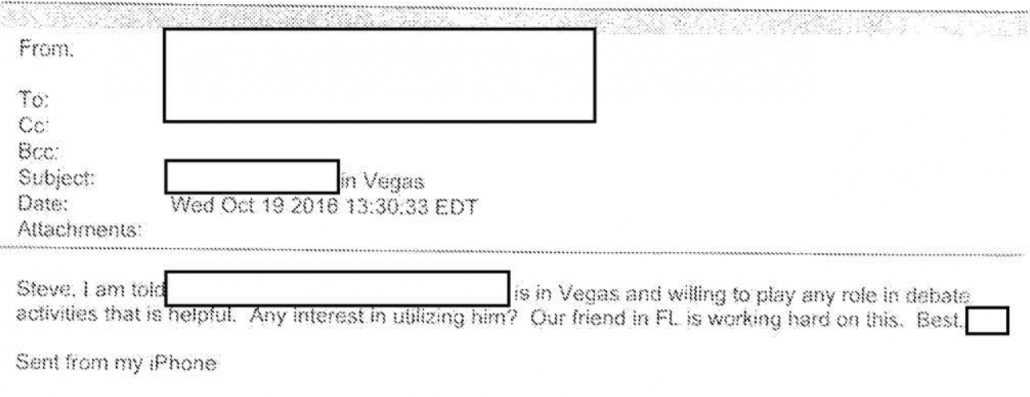
This is, then, an email about debate prep for the same October 19 debate where Erik Prince appears to have scripted Trump’s answer on Russia, though this time there’s a reference to “Our friend in FL,” which might be Stone.
The next email and discussion is not redacted. It pertains to a Prince fundraiser, which leads Bannon to disavow any coordination issue. As I’ll discuss in a follow-up, we know that Prince was fundraising for Stone at this time, which did pose coordination problems. The issue was supposed to come up at Stone’s trial, but did not.
Then Bannon is asked about the September 21 email via which Trump Jr sends a link to a WikiLeaks site (though Bannon was forwarded the email — he didn’t get it directly). The discussion of the email is not interesting. But Bannon’s disavowals on WikiLeaks, again, have been refuted by his subsequent testimony, including during Stone’s trial.
Bannon did not remember anyone else in contact with WikiLeaks. There was discussion during the campaign on how WikiLeaks could impact the race. Bannon did not think anyone had any ideas on where WikiLeaks had got their information. Bannon did not remember anyone reaching out to [redacted, almost certainly Stone], WikiLeaks, or any other intermediary to see what information might be coming.
Indeed, Bannon’s claims were almost immediately challenged in the interview, when Bannon was asked about the November 5, 2016 thread that started with Paul Manafort sending Jared a memo warning that Hillary would,
move immediately to discredit the [Trump] victory and claim voter fraud and cyber-fraud, including the claim that the Russians have hacked into the voting machines and tampered with the results.
Jared forwarded it to Bannon and David Bossie, in response to which Bannon said,
We need to avoid this guy like the plague.
They are going to try and say the Russians worked with wiki leaks to give this victory to us.
Paul is a nice guy but can’t let word get out he is advising us.
In response to being shown an email where he suggests Manafort was advising the campaign (the Mueller Report reveals that Rick Gates, in an interview just two days before this one, had revealed that Manafort told Gates he was still speaking with Trump, Kushner, and Bannon himself), Bannon claimed he,
was not aware of any instances of Manafort advising, or being involved in the campaign after his ouster.
Then, Bannon claimed that,
Candidate Trump never said to Bannon that he was in contact with [redacted, almost certainly Stone] or Manafort.
The substantive part of the interview ends, then, with Bannon making a tie between Manafort and (almost certainly) Stone that admits a tie between Stone and WikiLeaks that Bannon would later testify to, repeatedly, under oath, even while disclaiming any tie to Stone, even though emails would prove that false.
Bannon tells Mueller want to obtain warrants for
The last major paragraph of the interview lays out Bannon’s claims about his communications habits, including:
- Bannon had three cell phones but did not use either the campaign one or the “secure” one provided by the Federal government to ensure his communications remained secure
- He didn’t use the campaign iPad much
- He had no idea that his cell phone had been set up to not archive text messages (which is pertinent because his messages with Prince got deleted)
- He claimed not to use secure apps during the campaign and transition, but got ProtonMail and Signal not long before leaving the White House
- Bannon never used Slack, though Breitbart did
- Bannon got Wickr on Prince’s recommendation, but used Signal with other people
- He claimed not to know of all the people using secure apps
- After having just said he primarily used his personal cell phone, Bannon claimed not to have used his personal phone for White House business
- Bannon several times disclaimed any discussion of the importance of keeping his text messages to comply with the Federal Records Act
- Bannon said he primarily used his White House email to do business, but then described using his “arc-ent” one, but claimed they got archived a the White House
This language would be particularly useful for prosecutors to use in warrants.
But it’s also important for another reason. Most, if not all, of the referenced Bates stamps in this interview were clearly Steve Bannon’s own production, what he turned over himself. But we know of at least two key emails that don’t appear in this interview, either because they’re redacted, or because Bannon didn’t turn them over. One is an August 18, 2016 email from Stone, sent immediately after Bannon was publicly announced to be joining the campaign, promising Bannon he knew how to win the election. Another is an exchange from October 4 2016, showing Bannon showing great interest in WikiLeaks, in contradiction to the unredacted parts of his testimony. Plus, there’s a text from Bannon’s assistant, Andrea Preate, congratulating Stone after WikiLeaks stomped on the Access Hollywood tape.
To the extent that Mueller relied in this interview (and the earlier one, two days earlier) on Bannon’s production — and it’s not clear whether that’s what happened or not — it would leave the possibility that Bannon didn’t turn over things that were clearly responsive to any Mueller subpoena.
Again, we don’t know whether that happened or not. But Bannon’s unredacted testimony is inconsistent with exchanges with Stone we know were documented. And, as mentioned above, when Cohen was raided, Bannon lost it, pushing to fire Rosenstein after he had told Jared that firing Comey was the stupidest political decision in modern history.
As I disclosed in 2018, I provided information to the FBI on issues related to the Mueller investigation. And as a reminder, a significant part of my PhD work involved Czech literature.

